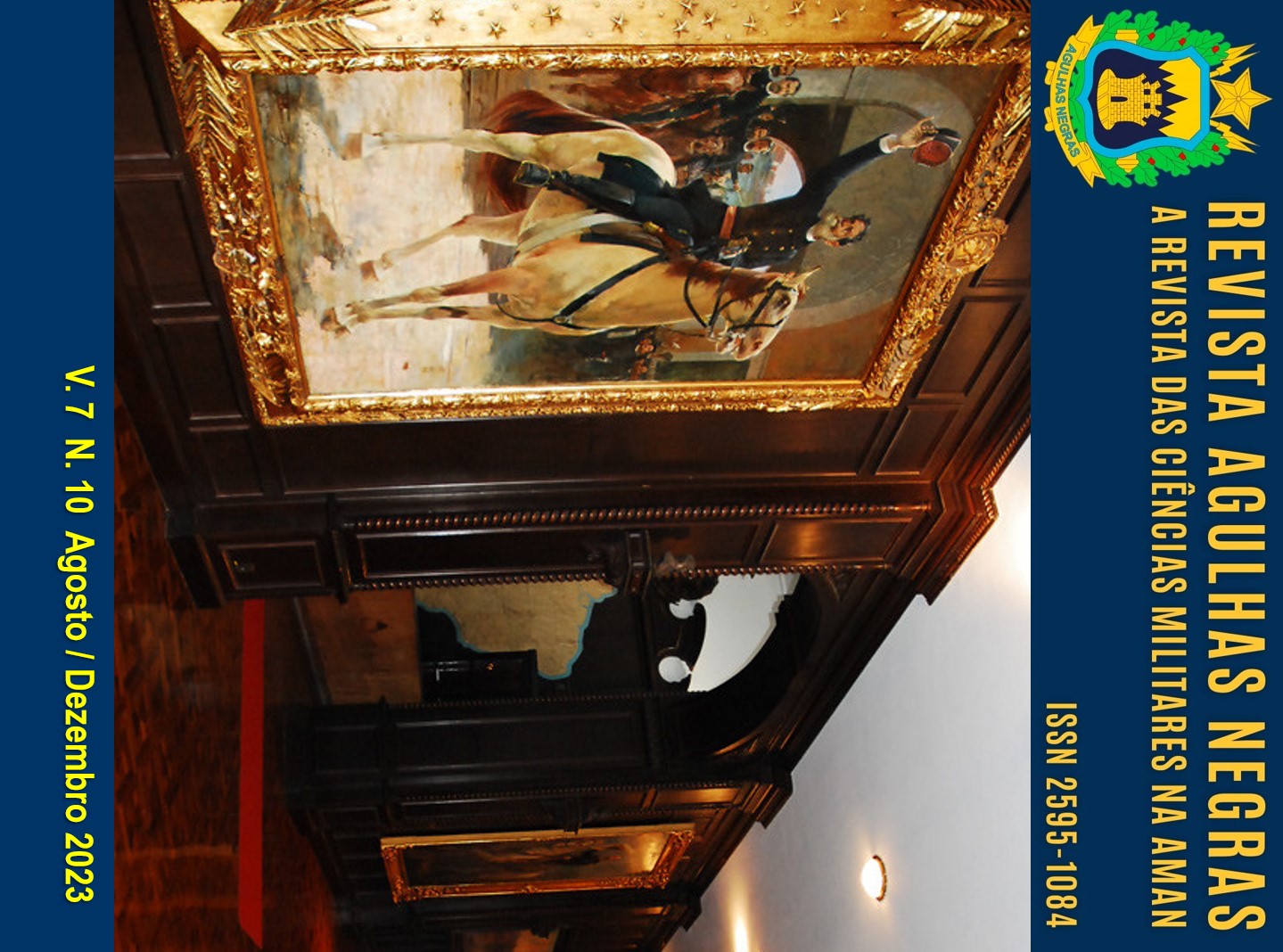A Influência do Desenvolvimento de Habilidades Emocionais para o Enfrentamento de Situações Estressoras na Formação Militar
Resumo
Este estudo ocorreu na Escola de Sargento das Armas (ESA), estabelecimento de ensino responsável pela formação do Sargento Combatente do Exército Brasileiro. Este trabalho relata a experiência sobre o desenvolvimento de habilidades emocionais no enfrentamento de situações estressoras na formação do sargento combatente e os efeitos dessa intervenção no desempenho dos alunos, durante uma semana de atividades em situação simulada de combate. Entre seis grupos que se submeteram à semana de treinamento, participaram da capacitação um grupo de 28 (vinte e oito) alunos. Foram utilizadas técnicas comportamentais que envolvem autoconhecimento, ensaios comportamentais e práticas meditativas. Os resultados coletados em pesquisa individual demonstraram percepção positiva na autoavaliação feita pelos alunos, observada pelos relatos de melhor controle da ansiedade, aumento do desempenho e maior qualidade no emprego do tempo. É significativa a constância dos resultados do grupo que recebeu a capacitação, nas avaliações realizadas pela equipe de instrução, alcançando a segunda melhor pontuação entre as seis equipes que realizaram as atividades durante a semana.
Downloads
Referências
BARDIN Laurence. Análise de conteúdo. Lisboa: Edições 70, 1977.
BECK, Judith S.Terapia Cognitivo-Comportamental: Teoria e Prática. 2 ed. Porto Alegre: ArtMed, 2013.
BION, W. R. Os elementos da psicanálise: o aprender com a experiência. Rio de Janeiro: Zahar, 1966
BRAGA, D., BARBOSA, N. E ROCHA, L. Quase metade dos brasileiros que fizeram check-up nos últimos meses têm estresse, diz pesquisa. 2022. Disponível em: https://www.cnnbrasil.com.br/saude/quase-metade-dos-brasileiros-que-fizeram-check-up-nos-ultimos-meses-tem-estresse-diz-pesquisa/. Acesso em: 21 DEZ 2022.
CARPENTER, William Benjamin. Principles of mental physiology. Nova York: Appeton, 1984.
CEBOLLA, Ausias; GARCÍA-CAMPAYO, Javier; DEMARZO, Marcelo. Mindfulness y ciencia: de latradición a lamodernidad. Madrid: Alianza Editorial, 2014.
EBERSPACHER, Hans. Entretenimento mental: un manual para entrenadores y deportistas. Zaragoza: INDE – Publicaciones, 1995.
ESCOLA DE SARGENTOS DAS ARMAS (ESA). Institucional. O Curso. Disponível em: http://www.esa.eb.mil.br/index.php/pt/sobre-o-curso. Acesso em: 02 JUL 2020b.
ESCOLA DE SARGENTOS DAS ARMAS (ESA). Ordem de Instrução n.º 002-S3 da SIEsp. Estágio Básico de Instruções Especiais (EBIE). 16 MAR 2020a. 143p.
GERMER, Christopher. K. Mindfulness: O que é? Qual é a sua importância? In: GERMER, C. K.; SIEGEL, R. D.; FULTON, P. R. Mindfuless e psicoterapia. 2 ed. Porto Alegre: Artmed, p. 2-36, 2016.
KABAT-ZINN, Jon. Mindfulness-based interventions in context: Past, present, and future. Clinical Psychology: Science and Practice, n. 10, v. 2, p. 144–156, 2003. Disponível em: https://onlinelibrary.wiley.com/doi/full/10.1093/clipsy.bpg016. Acesso em: 21 OUT 2020. DOI: https://doi.org/10.1093/clipsy/bpg016
LUFT, Caroline Di Bernardi et al. Versão brasileira da Escala de Estresse Percebido: tradução e validação para idosos. Rev. Saúde Pública, São Paulo, v. 41, n. 4, p. 606-615, Ago 2007. Disponível em: http://www.scielo.br/scielo.php?script=sci_arttext&pid=S0034-89102007000400015&lng=en&nrm=iso. Acesso em: 10 JUN 2020. DOI: https://doi.org/10.1590/S0034-89102007000400015
MARTI, Ausias Cebolla I., GARCIA-CAMPAYO, Javier, & DEMARZO, Marcelo. Mindfulness e ciência: da tradição à modernidade. São Paulo: Palas Athena, 2016.
SILVA, André. Autoconhecimento: O impulso para a evolução. GV Executivo, [S.l.], v. 18, n. 5, p. 42-44, out. 2019. DOI: https://doi.org/10.12660/gvexec.v18n5.2019.80377 . Acesso em: 21 JUN 2020. DOI: https://doi.org/10.12660/gvexec.v18n5.2019.80377
SMITH, Eric N.; YOUNG, Michael D.; CRUM, Alia J. Stress, Mindsets, and Success in Navy SEALs Special Warfare Training. Front. Psychol. Jan, 2020. Disponível em: https://www.frontiersin.org/articles/10.3389/fpsyg.2019.02962/full. Acesso em: 08 NOV 2020. DOI: https://doi.org/10.3389/fpsyg.2019.02962
TORRES, Clérisson. O autoconhecimento como método específico na busca de nosso centro. Núcleo de Estudos sobre Autoconhecimento e Desenvolvimento Socioemocional, p. 1-22, 2016. Disponível em: https://www.academia.edu/23944674/o_autoconhecimento_como_m%c3%89todo_espec%c3%8dfico_na_busca_de_nosso_centro#:~:text=o%20m%c3%a9todo%20espec%c3%adfico%20na%20busca,infinita%20de%20nuances%20e%20contradi%c3%a7%c3%b5es. Acesso em: 20 MAR 2020.
UNITED STATES OF AMERICA (USA). Department of Defense. Directive. DODD 6490.5. Washington, DC, 1999. Disponível em: https://www.marinha.mil.br/egn/sites/www.marinha.mil.br.egn/files/CPEM014%20TESE%20CMG%20%28Md%29%20GISELA.pdf. Acesso em: 26 OUT 2021.
ZABALA, Antoni; ARANU Laia. Como aprender e ensinar competências. Porto Alegre: Artmed, 2010.
Copyright (c) 2023 Lorival de Souza LIMA JÚNIOR, Daniela Carvalho BÉRGAMO (Autor)

This work is licensed under a Creative Commons Attribution 4.0 International License.









